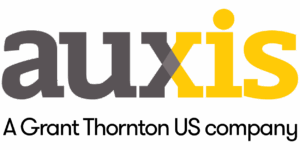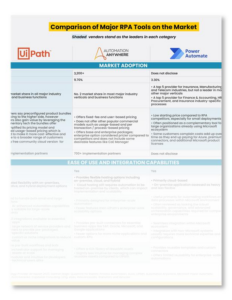Demand for automation has accelerated at a break-neck pace in 2022 – and it’s on track to move even faster. UiPath’s Automation Hub platform ensures your organization won’t get left behind, speeding and optimizing your automation journey with effective and efficient planning aligned with the mission and vision of your company.
In today’s fast-paced business environment, 70% of CEOs rank Robotic Process Automation (RPA) as a top priority for meeting strategic goals and ROI, the Economic Intelligence Unit reports. But 65% of organizations find their automation journeys stuck in the mud with 10 or fewer automations.
UiPath Automation Hub is a collaborative tool that keeps automation programs speeding forward by providing a central place to discover and manage automation opportunities. It makes it easy to turn great ideas from anyone into great automation for everyone – delivering enterprise-level benefits like effective prioritization, faster implementation, ease in measuring ROI, and broader automation availability.
Automation Hub also builds an internal RPA Community of Interest that helps scale adoption of the technology enterprise-wide, increasing organizational buy-in by enabling everyone to feel vested in the process:
- Center of Excellence (CoE) owners receive an evergreen, well-vetted automation pipeline that prevents RPA programs from stalling. Automation Hub also helps stakeholders increase ROI with better prioritization of automation idea
- Citizen developers can make their teams more effective by building and sharing personal time-saving automations. They can also add to their resumés by collaborating on CoE-approved automation opportunities.
- Business users can take control of the driver’s seat of automation initiatives with a central location for sharing ideas, providing feedback, and discovering ready-to-go automations. Employees can have robots do the mind-numbing, time-consuming work they hate while being rewarded for their ideas.
Let’s dig into the details of how Automation Hub works:
7 ways Automation Hub improves your automation journey
- Process identification. Collect automation ideas from an internal community of idea contributors, citizen developers, and automation users. Anyone can share ideas and requests for automation through the collaborative process identification tool.
- Leverage integrations with other important UiPath tools like Process Mining and Task Capture for fast, effective, AI-based discovery and documentation. Users can centrally capture and manage automation opportunities and process improvements prioritized by impact and ROI, while also automatically documenting and recording processes to accelerate automation development. Combining these tools with Automation Hub allows enterprises to easily visualize their map to ROI, understanding automation complexity and estimated costs and benefits.
- Pipeline management. Your organization’s automation plans, status, expected benefits, and other essential details are displayed in a single dashboard – making it easy to prioritize objectives. Users can express their opinions by upvoting ideas and requests. They can also track automations from idea to production from their command center.
- Process and documentation bank. A central repository contains all the essential documents related to processes selected as automation candidates.
- Automation marketplace. Create, store, search, and download reusable, ready-to-go components across a private automation library created by your citizen and RPA developers. Your CoE maintains full control over your “Automation Store,” governing access, views, and available actions. Users can view overviews of each automation and add reviews as well.
- Gamified change management. A key feature that helps ensure your human workforce is engaged and motivated to participate in your automation program long-term. Incentives like points, reward badges, and ranks help you read progress and focus on achievements in the RPA implementation field.
- Simplified user onboarding process. A set of dynamic flows integrated into the platform guides you through its features, enabling active involvement in each action to ensure they are easy to learn. The first flow covers generic features, while the second flow focuses on specific features related to your permissions and day-to-day activity.
But how do I know Automation Hub’s assessments are accurate?
Every idea submitted to Automation Hub undergoes a two-level assessment to identify processes ripe for automation. Submissions are vetted based on their suitability and readiness, ensuring your organization only invests time in automations that provide value to the company.
- High-level assessment. Idea contributors answer a set of nine questions about their proposals. The platform provides instant feedback through a calculated automation score, including a short explanation about how it was obtained. Duplicate ideas are filtered out.
- Detailed assessment. If the idea score indicates the proposal has potential, it is further assessed to determine automation scope and the technology required to implement it. The process owner is invited to provide more specific details in a separate questionnaire, including a list of applications used in the process. An algorithm generates an assessment score with a set of KPIs customized for your organization that reveal:
- Automation potential expressed in percentage.
- Ease of implementation expressed in percentage.
- Estimated hours saved per year.
Considering these KPIs and your organization’s automation goals helps stakeholders effectively select and prioritize which automations to implement.
Maximize the benefits of Automation Hub with a certified UiPath partner
McKinsey estimates that 3.6 trillion hours of work are automatable in developed countries alone – freeing millions of employees bogged down by tedious tasks to focus on higher-value work. But at a time when most organizations struggle to move past an RPA Proof of Concept, UiPath’s Automation Hub makes it easy to accelerate and manage your automation journey at scale.
Automation Hub fosters an open, transparent, and collaborative community that keeps excitement and momentum behind your automation program with a constant flow of crowd-sourced, well-vetted ideas. It also simplifies management with a central location to discover, prioritize, and track automation initiatives.
A free, 60-day trial lets organizations explore the benefits of UiPath Automation Hub by creating five attended, five unattended, five test, and five Studio robots.
A certified UiPath implementation partner is also essential to maximizing the benefits of Automation Hub throughout an end-to-end RPA journey. Exceptional partners are experts at reviewing and prioritizing automations in the pipeline for optimal impact and ROI, provide experienced RPA talent to design and implement automations successfully, and offer ongoing support when unexpected process exceptions like website changes inevitably require adjustments.
Some 70% of UiPath customers rely on UiPath partners to get started with RPA – recognizing the need for expertise and experience that isn’t available in-house.
With an automation pipeline that’s never depleted and expert guidance to keep your journey on track, Automation Hub and the right implementation partner can make your digital transformation a reality. Contact us to learn more about our UiPath implementation services.



